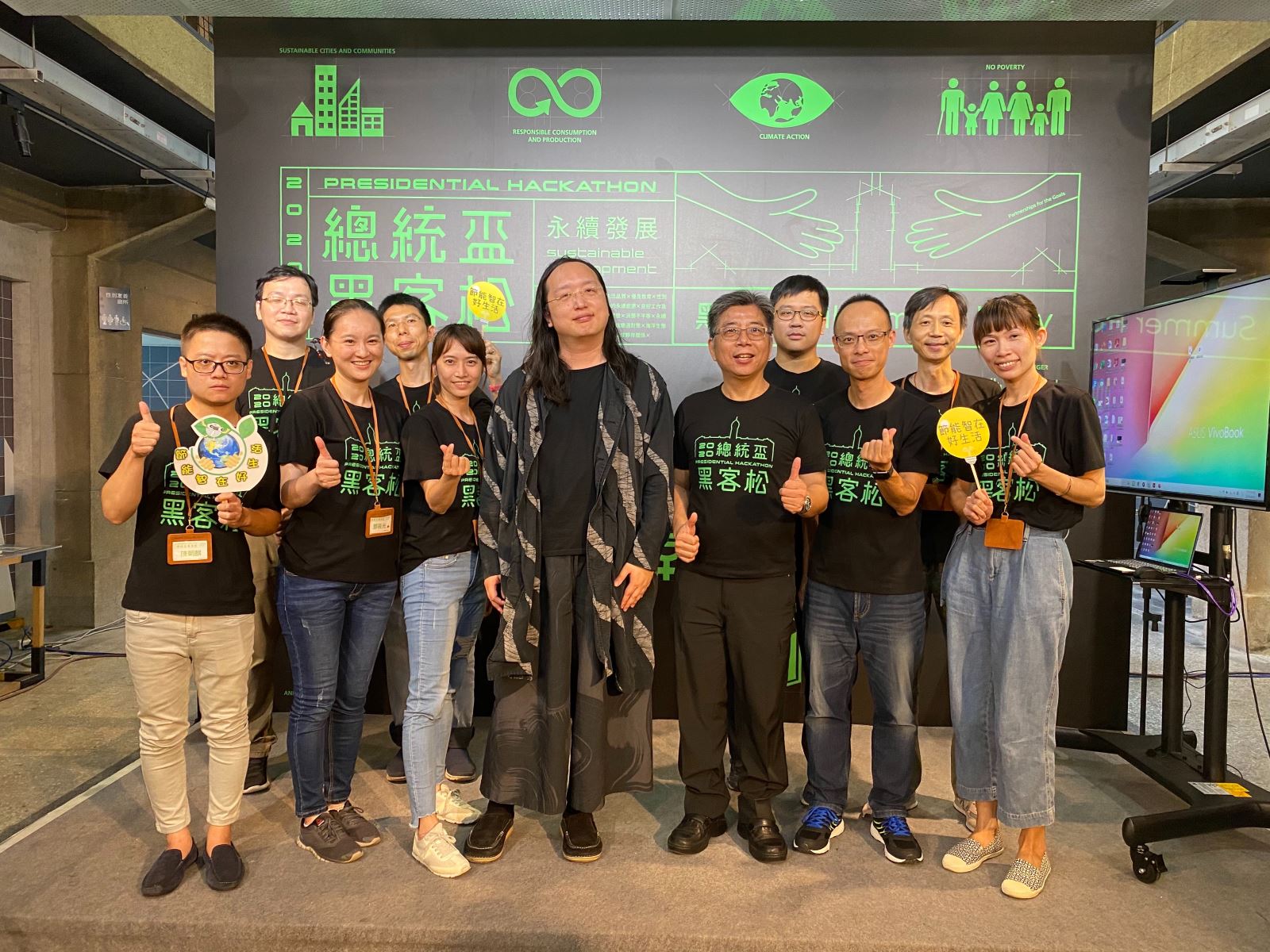
- Team "Smart Energy Saving to Good Life" with Audrey Tang, Taiwan's Digital Minister and coordinator of Presidential Hackathon.
Taipower, together with the New Taipei City Government and the Institute for Information Industry, formed the "Smart Energy Saving to Good Life" team, which was ranked the top five in the Presidential Hackathon finals and won the "Team of Excellence" award. The team will be called in to meet with the President in September. Taipower stated that it continues to brainstorm through competitions held within the organization, allowing power data to have more application value. This year, Taipower made its debut in the national-level Presidential Hackathon Competition. With cross-departmental and cross-field collaboration, the team successfully stood out among hundreds of entries and achieved great results.
Taipower pointed out that to optimize the quality of customer service, the "Smart Energy Saving to Good Life" team of Taipower’s Department of Business used the large amount of the data from AMI (Advanced Metering Infrastructure) smart meters, incorporated the "Non-Intrusive Load Monitoring (NILM)" technology developed by the Institute for Information Technology, and analyzed the electricity consumption data of 145 HEMS demonstration users in the low-carbon community development center provided by the Department of Environmental Protection, New Taipei City Government to develop an AI big data model. The model can accurately predict electricity consumption information and create smart electricity usage as well as innovative services that are benefit to users, greatly improving the application value of the data from AMI smart meters.
Taipower said that the entire team has been working together for half a year in proposing ideas, cross-field discussion and focus, model training, field demonstration, and model adjustment prior to its completion. For the initially created electricity consumption model, field demonstration and comparison with the actual electricity consumption of other communities were conducted by the team to verify the accuracy of the model. In addition, the electricity consumption data of users were further collected by means of personal visits and interviews to re-calibrate the model, allowing the produced results to be more accurate. During the interviews of the users, the electrical appliance usage analysis and the customized energy saving recommendations provided by the model have received great recognition from the users, making the users willing to provide feedback information on household electricity characteristics, and allowing the adjustment of the model to be completed successfully.
Taipower emphasized that in the future, in conjunction with the deployment of AMI smart meters, it will incorporate the electricity usage checking services and the electricity safety inspection timing to further collect the electricity characteristics of the users for optimizing the model. The users can also get a hold of the electricity usage period and electricity consumption of the main electrical appliances in the house at any time, screening out the electrical appliances with high energy consumption. By implementing the reduction of time-of-use rate or the shifting of peak electricity consumption, and comparing with users of the same type, energy-saving motivation can be stimulated. It is expected that 6 million AMI smart meters will be deployed in 2030 to save approximately 1.9 billion kwh of electricity annually, which is equivalent to the current annual electricity consumption of households in Hsinchu County and City. It can also be used in many ways. For instance, through cross-industry alliances, electrical maintenance and replacement services can be offered to users, promoting the development of the energy-saving home appliance industry.
Taipower pointed out that since 2016, it has been organizing a number of power open data creativity competitions. In May 2019, Taipower held a power data application competition, the "AI Big Data Talent Development Camp", within the organization for the first time, allowing departments of Taipower to organized 8 teams to compete and learn from each other. This time, Taipower took a step further to organize 6 teams from power generation, dispatching, transmission & distribution, electricity sales and information security departments to apply for the "Presidential Hackathon" competition. The competition has received a total of 300 entries, and 24 of them were selected for the preliminary review. Among the selected entries, 4 of them were from Taipower. Although only one team entered the final round and was awarded the "Team of Excellence", the overall performance was remarkable. The result is also a recognition to Taipower's long-term cultivation of big data talents.
【News Dictionary】Non-Intrusive Load Monitoring (NILM)
Conventionally, monitoring of household electricity consumption behavior is mostly relied on the installation of household energy management and monitoring equipment. However, the equipment is expensive, difficult to install and the installation is intrusive, making it hard to accept by the general public.
The Non-Intrusive Load Monitoring (NILM) technology uses the voltage, current, and power, measured by smart meter, as well as the artificial intelligence electricity consumption analysis technology, to identify the operation behavior and electricity consumption information of a specific electrical equipment at home in a certain period of time, which is helpful in assisting users to carry out independent power management.
Spokesperson:Professional Chief Administrator, Ting-Shu Zhang
Tel:(02)2366-6271/ 0936-625-552
Email: u742433@taipower.com.tw
Contact Person: Senior Professional Administrator of the Department of Business, Liang-Zhi Gong
Tel:(02)2366-8492/ 0963-366-550
Email: u872236@taipower.com.tw



